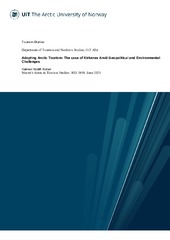Adopting Arctic Tourism: The case of Kirkenes Amid Geopolitical and Environmental Challenges
Author
Kalewar, Ranjith KumarAbstract
This thesis explores how the tourism industry in Kirkenes, a Norwegian border town in the Arctic, has adapted to contemporary geopolitical disruptions—most notably the consequences of the Russia-Ukraine war. Historically reliant on Russian visitors and situated near a politically sensitive border, Kirkenes faced substantial challenges following the collapse of cross-border mobility and increasing geopolitical tensions. Using a qualitative research design based on semi-structured interviews with tourism stakeholders and informed by academic literature across tourism resilience, destination branding, and curiosity-driven tourism, this study investigates how local actors have reimagined Kirkenes as a Finnish-Arctic destination. It analyses the impacts of reduced Russian visitation, the rise of "border curiosity tourism," and the strategic realignment with Finnish tourism networks. The research applies resilience theory to highlight how stakeholders leverage diversification, cross-border collaboration, and narrative reconstruction to maintain economic viability in a volatile regional context. The findings reveal that while tourism actors have embraced adaptive strategies and alternative branding, broader community resilience is constrained by the fragility of other non-tourism sectors. Ethical reflections are interwoven, particularly regarding the anonymity of informants and the implications of studying tourism connected to geopolitical conflict. Ultimately, the thesis contributes to scholarship on Arctic tourism by offering localised insights into how small peripheral destinations navigate uncertainty through innovation, repositioning, and strategic partnerships. This thesis explores how the tourism industry in Kirkenes, a Norwegian border town in the Arctic, has adapted to contemporary geopolitical disruptions—most notably the consequences of the Russia-Ukraine war. Historically reliant on Russian visitors and situated near a politically sensitive border, Kirkenes faced substantial challenges following the collapse of cross-border mobility and increasing geopolitical tensions. Using a qualitative research design based on semi-structured interviews with tourism stakeholders and informed by academic literature across tourism resilience, destination branding, and curiosity-driven tourism, this study investigates how local actors have reimagined Kirkenes as a Finnish-Arctic destination. It analyses the impacts of reduced Russian visitation, the rise of "border curiosity tourism," and the strategic realignment with Finnish tourism networks. The research applies resilience theory to highlight how stakeholders leverage diversification, cross-border collaboration, and narrative reconstruction to maintain economic viability in a volatile regional context. The findings reveal that while tourism actors have embraced adaptive strategies and alternative branding, broader community resilience is constrained by the fragility of other non-tourism sectors. Ethical reflections are interwoven, particularly regarding the anonymity of informants and the implications of studying tourism connected to geopolitical conflict. Ultimately, the thesis contributes to scholarship on Arctic tourism by offering localised insights into how small peripheral destinations navigate uncertainty through innovation, repositioning, and strategic partnerships.
Publisher
UiT The Arctic University of NorwayMetadata
Show full item recordCollections
Copyright 2025 The Author(s)


 English
English norsk
norsk
